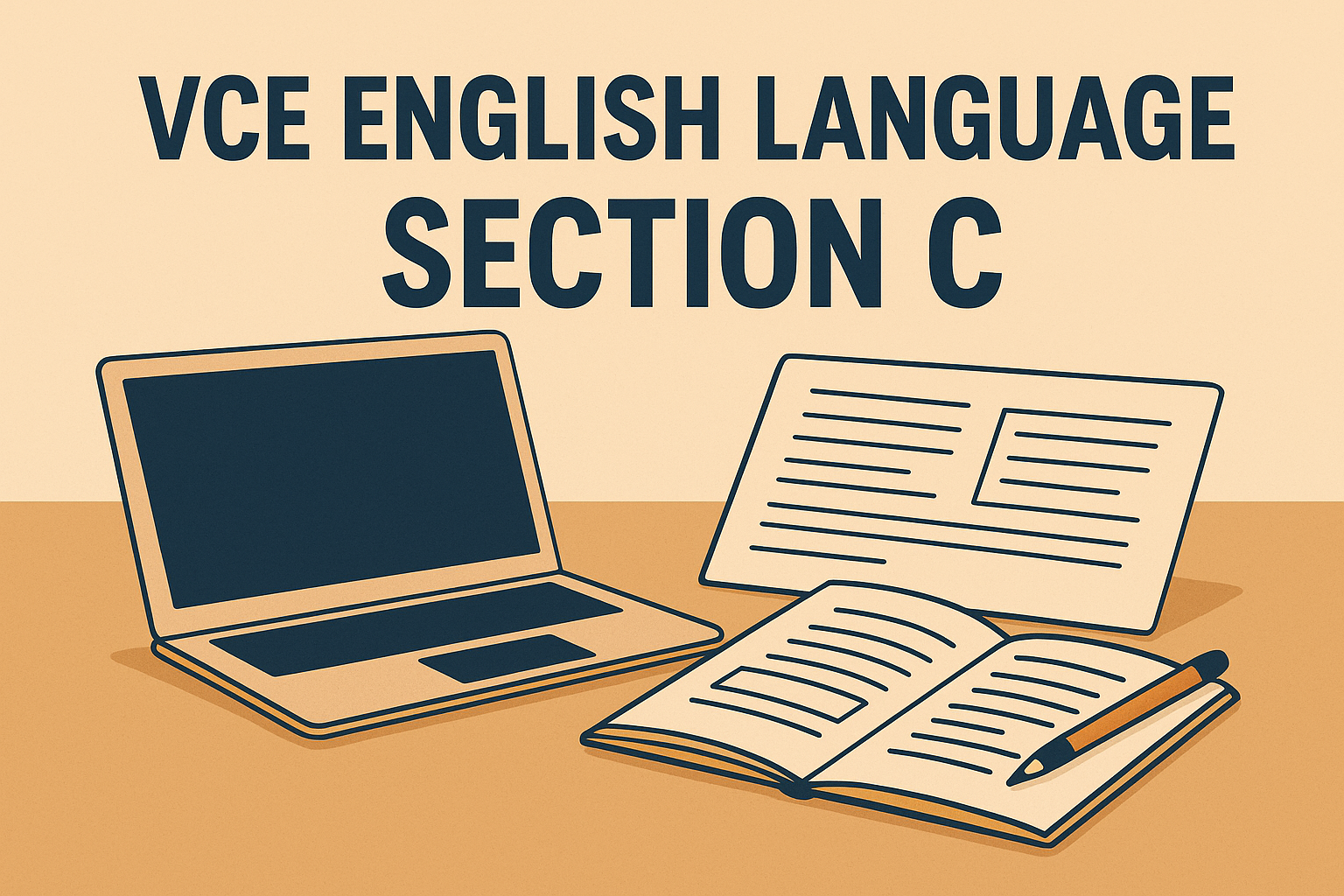
Hi everyone, my name is Poorva, and I graduated from Mac.Rob in 2024, scoring a raw 46 in English Language 3/4.
Today, I’ll be providing a step-by-step guide on how to prepare for Section C of the VCE English Language 3/4 Exam (Essay) — and with just 3 weeks to go, now is the time to consolidate everything you’ve learned!
If you’re looking for a broader overview of how to approach your VCE English Language exam preparation, check out my previous article:
👉 How do I prepare for the VCE English Language exam (Step-by-Step Guide)?
As a VCE English Language tutor in Melbourne, I’ve seen many students struggle with Section C initially. However, with consistent practice and the right preparation strategy, you can confidently tackle any essay topic that appears on the day of the exam.
1. 📘 Build a Strong Foundation Before Exam Day
With the right preparation behind the scenes, you’ll be ready for any essay the VCAA gives you. Here’s how to prepare effectively:
- Review the Study Design:
Go back over the official VCE English Language Study Design and make a complete list of all the language features covered across the year.
At VCE Excel Education, we work with students to build this list gradually, ensuring everyone knows what features can be applied in the exam. - Build Your Example Bank:
Throughout the year, you should’ve been creating a contemporary language example bank. Now’s the time to fill in any gaps with your own research.
This is one of the key habits I encourage through my VCE English Language programs. - Connect Examples to Concepts:
For each quote or feature, ask yourself:- What sociolinguistic variable does this relate to?
- How can it connect to a language function or social purpose that might appear in a prompt?
- Memorise Smartly, Not Rigidly:
Learn your elaborations and examples well, but when you write the essay, don’t just copy what you’ve memorised.
Always adapt them to the key words of the essay prompt.
2. 🧠 Choosing the Right Essay Prompt
One of the most important skills for Section C is knowing which prompt to choose.
- Go through past VCAA and company exams and ask yourself:
- Which of these three prompts allows me to showcase my strongest paragraphs?
At VCE Excel Education, we complete this exercise weekly in the lead-up to the exam and give students feedback on why certain prompts work better.
- Which of these three prompts allows me to showcase my strongest paragraphs?
- Once you’ve chosen your preferred prompt:
- Plan a clear contention.
- Outline your three body paragraphs with key examples and analytical focus.
3. ⏱ Exam Timing and Reading Strategy
Here’s how to approach reading time and writing order during the actual exam:
- Reading time (2–3 minutes):
a. Read all three essay prompts and their stimulus carefully. (1 min)
b. Decide which one you’ll use and plan out your three body paragraphs. (1 min)
c. Choose which stimulus piece best supports your essay. (30 sec) - Writing order:
- Write your Essay after the SAQ (Section A) but before the Analytical Commentary (Section B).
- Aim to complete Section C in 45–50 minutes.
This gives you enough time to finish your Analytical Commentary properly.
- Adapting your elaborations:
- Integrate key words from the prompt.
- Every sentence should directly answer the question.
- Avoid writing generic statements — tailor everything to the prompt’s specific focus.
4. 🧾 Marking and Reflection
Once you finish your essay, don’t mark it immediately. Wait a few hours or even until the next day to get a fresh perspective.
This allows your mind to decompress and lets new ideas emerge naturally.
To get the most out of your reflection:
- Swap responses with a peer to remove bias and gain new perspectives.
- Record your mistakes and highlight high-yield features that appear frequently across prompts.
- Write learning summaries to reinforce what worked and what didn’t.
This process is a big part of what makes our VCE English Language tutoring sessions and VCE English Language programs effective — because it turns mistakes into strengths.
5. 🎯 Study Schedule for the Final Weeks
There’s no need to write more than 1–2 essays per week in the final stretch.
Your main focus should be:
- Memorising examples and elaborations daily
- Brainstorming and planning responses to prompts every other day
This balance keeps your writing skills sharp without burning out.
🌟 Final Thoughts
Section C is your opportunity to show your conceptual understanding, writing control, and ability to adapt under pressure.
With daily exposure to examples, careful prompt analysis, and self-reflection, you can walk into the exam feeling confident and ready.
If you’d like more personalised guidance or structured feedback, consider joining a VCE English Language program or working with an experienced VCE English Language tutor in Melbourne — it’s the most effective way to refine your essay writing under expert supervision.
